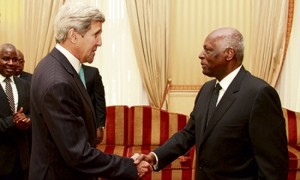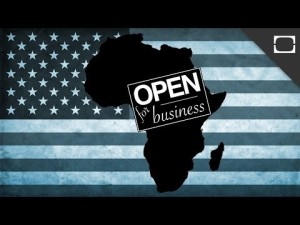 Bilateral relations between the U.S. and Angola have not always been so smooth but the visit of Secretary of State John Kerry to the ever-developing African country in May marked 21 years of full diplomatic relations which have been fruitful for both nations
Bilateral relations between the U.S. and Angola have not always been so smooth but the visit of Secretary of State John Kerry to the ever-developing African country in May marked 21 years of full diplomatic relations which have been fruitful for both nations
Twenty-one years after the United States and the oil-rich, southern African nation of Angola established full diplomatic relations, U.S. Secretary of State John Kerry flew into the country in May to mark that occasion and further cement those ties which have benefited both countries.
“There is much we can work on together – not just on the economics but on security in the region, on development and regional issues,” Mr. Kerry told reporters after meeting with Angolan President José Eduardo Dos Santos and Minister of Foreign Affairs Georges Chikoti.
He added: “Angola is a very important partner in the region, and the relations between Angola and the United States are, in fact, moving on an upward trajectory and getting stronger with each meeting that we have.”
The relationship is still a relatively new one. The U.S. could not ignore for long such an important country in a vital region and once ties were established, Angola was designated as a “strategic partner”. Things have since blossomed.
Since then Washington has worked hard with Luanda to help it overcome the devastation of the civil war and improve its economy, the democratization process, and the general well-being of Angola’s 19 million people.
Four years ago, the two governments signed a Strategic Partnership Dialogue agreement, further boosting the U.S.’s role in developing the country. “The people of Angola must receive the benefit” of these efforts, Mr. Kerry said. “We also hope that more Angolans will be able to bring their talents to the use of their country through greater engagement with their government in a more open and engaged civil society.”
Oil and gas, of course, has played a huge role in bilateral economic ties with the sector largely responsible for Angola’s status as the U.S.’s second-largest trading partner in all of sub-Saharan Africa.
 U.S. petroleum giants like Chevron, ExxonMobil and ConocoPhilips are active in the country’s extractive resources sector but other U.S. firms are also present in Angola which diplomats and others describe as a most promising investment destination with one of the fastest-growing economies in the world today.
U.S. petroleum giants like Chevron, ExxonMobil and ConocoPhilips are active in the country’s extractive resources sector but other U.S. firms are also present in Angola which diplomats and others describe as a most promising investment destination with one of the fastest-growing economies in the world today.
As the country’s petroleum wealth trickles down to the general population creating a middle class and fueling consumer demand, U.S. companies providing quality goods and services know Angola is a good bet.
“It has been a very rewarding market” for such companies, says the U.S. Embassy in Angola, which recently saw Helen La Lime appointed as U.S. Ambassador to Angola. “That is why you see GE here, as well as a John Deere dealership and that is why Microsoft has opened an office,” the embassy explains, adding that Yum Brands, the parent company of iconic U.S. food outlets KFC, Taco Bell and Pizza Hut, is also now doing business in Angola.
“This shows that it is not only the oil and gas industry but rather the power of Angolan consumers benefitting from the country’s economic growth” that is luring U.S. firms.
The Embassy describes the business environment as “ripe with opportunities” and says the U.S. government assists Angolan and U.S. enterprises to do business.
“We help Angolan businesses understand how they can make links with the U.S. through purchasing, partnerships, etc. and help U.S. companies enter this market by introducing them to groups like the state-run Angolan Private Investment Agency.”
And, according to Minister of Foreign Affairs Chikoti, the Angolans are keen on further U.S. investment.
“We have been working with the American Chamber of Commerce here to make sure that the American investment community is aware of the opportunities that Angola has to offer in the oil and non-oil activities,” he says. “Political and social stability, along with the growing confidence in President José Eduardo Dos Santos, is helping to raise American interest.”
Deeply involved in these efforts is the U.S. government’s Export-Import Bank which finances foreign purchases of U.S. products and according to the institution’s regional director for Africa, Rick Angiuoni, Angola is on the right track.
“Angola has the right internal environment to create the right market conditions. For instance, the country has solid macroeconomic foundations, sound institutions and a banking sector that is small but well capitalized,” he explains.
“Last year when we were kicking around the idea for a slogan for the 20th anniversary of U.S.-Angolan ties,” says the U.S. Embassy, “we came up with ‘Friendship is Always Growing’ and I think that perfectly captures all we have achieved together.”















